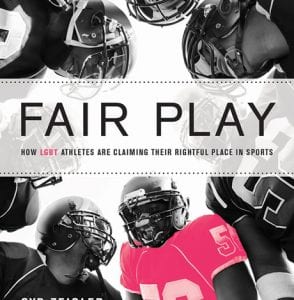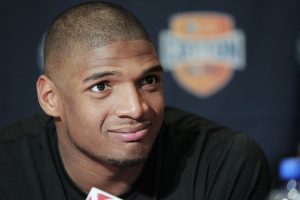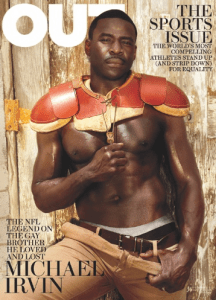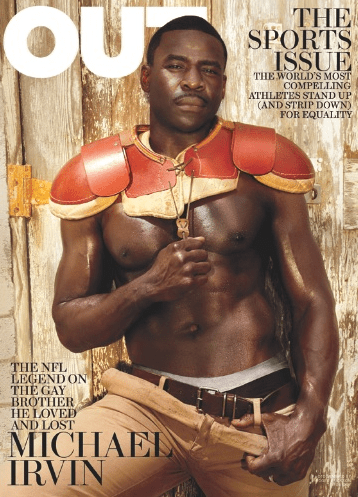 As we begin the Rio Games, we consider the progress of gays in sports
As we begin the Rio Games, we consider the progress of gays in sports
Conventional wisdom says that the locker room is the last closet. The sports world is seen as unwelcoming, anti-gay, left behind in a pathetic time warp while the rest of America hurtles forward, embracing LGBT issues, rights and people.
Conventional wisdom, says Cyd Zeigler, is wrong.
That’s the driving force behind his new book, Fair Play: How LGBT Athletes are Claiming Their Rightful Place in Sports. A cofounder of Outsports — since 1999, the go-to website for news, photos and resources about gay athletics — Ziegler has written more coming-out stories than any American journalist.
For nearly two decades, Zeigler has chronicled the journeys of NBA and NFL players; college and high school athletes, and coaches, umpires, sportswriters. After hundreds of interviews and follow-ups, he’s convinced that the real story is just how accepting teammates, fans and even opponents are when a gay sports figure comes out.
In fact, Zeigler says, he cannot recall one instance in which negative reactions outweighed the positive ones.
Want proof? In the two years he spent writing Fair Play, Zeigler kept adding new stories and experiences. As soon as one edit was done, another famous athlete came out, another team or league took a big step forward, or another ally stood up for LGBT rights. Finally, Zeigler said, “Stop! Let’s print it!”
The book’s 12 chapters cover a wide swath of gay sports issues. Headings include “Young Athletes Are Why There Will Never Be a ‘Gay Jackie Robinson,’” “Straight Guys Look Too” and “Fallon Fox Is the Bravest Athlete in History.”
The first chapter is “John Amaechi and Tim Hardaway’s ‘Tipping Point’ Moment.” It’s about the NBA player’s coming-out experiences — specifically, what happened afterward. Former All-Star Tim Hardaway told a Miami radio audience that he “hated” gay people. Furthermore, he said, they should not be part of the locker room.
Reaction was swift — and anti-Hardaway. Zeigler calls it “the day the homophobes lost the culture war in sports.”
The American culture war continues, of course. It plays out in politics, most recently in North Carolina where legislators hastily passed a “bathroom bill” to address a non-existent problem with trans people.
 In sports, Zeigler calls Michael Sam’s experience “chilling.” After coming out in college — and earning awards for his play — the University of Missouri football star was unable to catch on with any NFL team.
In sports, Zeigler calls Michael Sam’s experience “chilling.” After coming out in college — and earning awards for his play — the University of Missouri football star was unable to catch on with any NFL team.
In a chapter titled “The Big Lie of the Big Five,” Zeigler tackles the prevailing belief of executives of the major sports leagues that any professional athlete who came out would create an unwelcome, unacceptable “distraction.”
“I’ve been to the Super Bowl,” Zeigler writes. “It’s a distracting mess. The media is ever-present. The host city is overrun with fans, celebrities, major corporations, and parties, from dawn to dusk. If a team’s front office cannot handle the attention a gay athlete might bring, it is woefully ill-equipped to win a world championship.”
Zeigler makes clear that sports owners and executives are out of step with the times. He counters every Michael Sam-non-signing story with many more counterintuitive ones. (Counterintuitive, that is, unless you’ve been paying attention — as he has — to what’s really going on in the sports world.)

ZIegler’s Out magazine interview with former Dallas Cowboy Michael Irvin is considered a watershed in paving the way for LGBT understanding in mainstream team sports.
Zeigler’s favorite story might be retired Dallas Cowboy Michael Irvin’s. The NFL Hall of Famer and three-time Super Bowl champion came out as the brother of a transgender person or drag queen (he’s not sure). He supported same-sex marriage, and said he’d have no problem with a gay teammate.
Then — as part of Zeigler’s interview for a cover story with Out magazine — he enthusiastically posed shirtless.
Like the Amaechi and Hardaway moment, Zeigler calls the Irvin story a “game-changer.” So was a follow-up interview with the NFL Network, when Irvin connected his support for LGBT issues with his own experiences as an African American. “Equality for all means equality for all,” he said simply.
Zeigler admits that at times he himself has fallen into the trap of putting most athletes in boxes where they don’t belong. Writing Fair Play has helped him realize that much of the sports world is further along than many people realize.
He hopes it will reach a wide audience. Review copies were sent to mainstream media. They’ve been interested in it — further evidence that sportswriters also understand the importance of, and advances sweeping through, the LGBT sports world.
Meanwhile, the coming-out stories keep coming. Zeigler proudly recounts the story of a young athlete who read Fair Play the moment it appeared on Kindle. He showed it to his parents, to help them understand his experiences.
“I wish more people could see what I see,” Zeigler says. “There is nothing more powerful — for an athlete or teammates — than coming out.”
And no one has seen or described more great coming out stories than Cyd Zeigler.
—Dan Woog
This article appeared in the Dallas Voice print edition August 5, 2016.
















